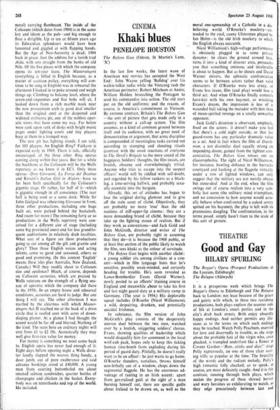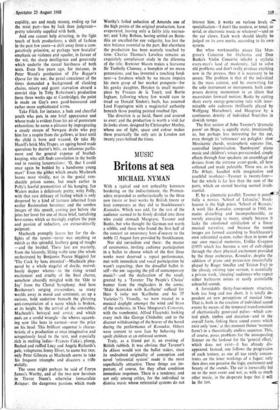THEATRE
Good and Gay
HILARY SPURLING
The Beggar's Opera (Prospect Productions at the Lyceum, Edinburgh) The Relapse (Aldwych) It is a prosperous week which brings The Beggar's Opera to Edinburgh and The Relapse back to London; not least because of the grace and gaiety with which, in these two ravishing productions, both plays explore the seamier side of life at London's smart parties and in the city's drab back streets. Both enjoy absurdly happy endings. And neither permits any illu- sions as to the terms on which such endings may be reached. Watch Polly Peachum, married for love and deservedly in trouble, as she sings about the probable fate of the virgin who, once plucked, is trampled underfoot like a flower at Covent Garden—'Rots, stinks and dies!' sings Polly rapturously, on one of those clear soar- ing trills so popular at the time:The brutality of the words and the radiant melody, Polly's high romantic folly checked, so to speak, at source, are most delicately caught. And it is this contrast, running through both plays, which makes the progress of these shrewd heroes and wary heroines so exhilarating to watch, as they edge precariously -between lust and
cupidity, sex and ready money, ending up for the most part—less by luck than judgment— pretty tolerably supplied with both.
And one cannot help detecting, in the light touch of both productions, a shift of fashion in the past few years—a shift away from a com- paratively primitive, or perhaps 'new brutalise emphasis on violence and squalor, in favour of the wit, the sharp intelligence and generosity which underlie the casual harshness of both texts. Even five years ago, for instance, in Peter Wood's production of The Beggar's
Opera for the RSC, the penal conscience of the times demanded a background of clanking chains, misery and gaunt starvation aboard a convict ship. In Toby Robertson's production (seen three weeks ago at Cambridge), the point is made on Gay's own good-humoured and rather more sophisticated terms.
Take Filch, for instance, a lank and cheerful youth who puts in one brief appearance and
whose trade is evident from his air of premature exhaustion; he earns a pittance by impregnating a steady stream of Newgate drabs who pay
him for a respite from the gallows, at least until the child is born and weaned. Or take Hy Hazell's brisk Mrs Trapes, an ageing bawd made querulous by doctor's bills, an infamous parlia- ment and the general expense of brothel- keeping, who still finds consolation in the bottle and in rousing lamentations: '0, that I could once again be bedded by a handsome young man!' Even the gibbet which awaits Macheath looms most vividly, not in the genial ram- shackle prison scenes, but much earlier in Polly's fearful premonition of his hanging. Jan Waters makes a deliciously pretty, witty Polly, with that rare delicacy of feeling which is only deepened by a kind of tartness inherited from earlier Restoration heroines; and the sombre images of this speech, coming just before she joins her lover for one of those brief, tantalising love-scenes which so teasingly explore the pain and passion of seduction, are extraordinarily poignant.
Macheath promptly leaves her for the de- lights of the tavern—never was anything so rakish as this splendid, leathery gang of toughs —and the brothel. These last are masterly, from the leisurely, lilting waltz tune (the whole orchestrated by Benjamin Pearce Higgins) for 'The Cock by hens attended'—Macheath plea- sured by a whole stageful of docile, marvel- lously dapper whores—to the rising sexual excitement and cruelty of the final chorus, somehow absurdly mingled with the 'Ode to Joy' from the Choral Symphony. And here Beethoven's surging crescendoes, so many worlds away in mood and sentiment, set up a curious, bold undertow beneath the glittering anti-romanticism of a scene which is broken, at its height, by the arrival of the constables, Macheath's betrayal and arrest; and which ends on a sordid wrangle—the whores squawk- ing now like hens in earnest—over the price on his head. This brilliant sequence is charac- teristic of a production at once imaginative and scrupulously loyal to the text, and especially rich in melting ladies—Frances Cuka's plump, flushed and ruffled Lucy and Angela Richards's pale, voluptuous Jenny Diver, to name but two; only Peter Gilmore as Macheath seems to take his frequent triumphs and disasters a trifle stolidly.
The same might perhaps be said of Emrys James's Worthy, and of the two new heroines in Trevor Nunn's otherwise immaculate Relapse: the dangerous passions which made
Worthy's foiled seduction of Amanda one of the high points of the original production, have evaporated, leaving only a fairly trite encoun- ter; and Toby Robins, having settled on Berin- thia an uncalled-for coy vulgarity, has lost the nice balance essential to the part. But elsewhere the production has been scarcely touched by time. Charles Thomas's Loveless remains an exquisitely complaisant study in the dilemma of the title; Brewster Mason makes a fearsome Sir Tunbelly Clumsey, a bumpkin of no mean pretensions, and has invented a touching fond- ness—a fondness which by no means impairs his stern grasp of her market prospects—for his gawky daughter, Hoyden (a small master- piece by Frances de la Tour); and Barrie Ingham, following where few would care to tread on Donald Sinden's heels, has assumed Lord Foppington with a magisterial authority beneath those pouting painted rosebud lips.
The direction is as lucid, fluent and assured as ever; and the production is worth a visit for its looks alone, designed by Christopher Morley, whose use of light, space and colour makes these practically the only sets in London not twenty years behind the times.



































 Previous page
Previous page